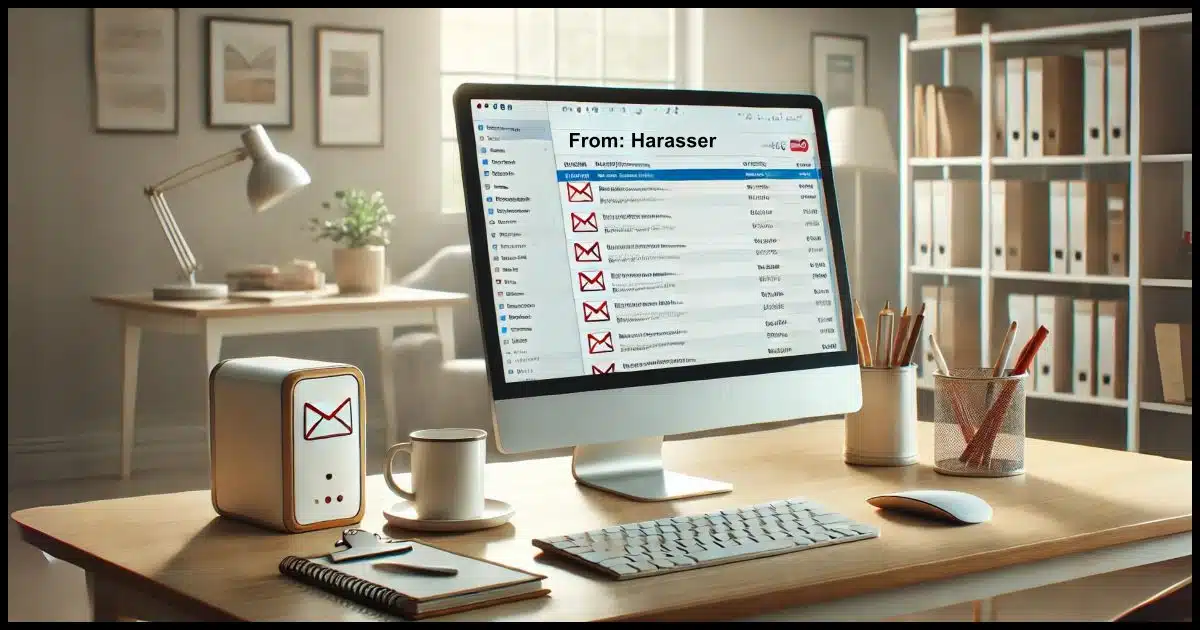Something as simple as an email address can lead to problems.

Someone got my email address from an online post I made, and now they’re harassing me. What can I do?
Over the last 20 years, I’ve gotten regular questions on this topic.
Somehow, someone has managed to get some information about you — as simple as an email address — and started using it to stalk, harass, and otherwise threaten you.
Let’s walk through a few things you can do if you’re being harassed by email.

Dealing with harassment via email
Online harassment via email can be scary. Take action: filter harassing emails, consider a new email address, and avoid clicking links or attachments in harassing emails. Consider documenting all communications and seeking help from law enforcement or professionals. And, of course, be cautious about sharing personal information to prevent future incidents.
Block the emails, but not the way you think
Common advice is to block the email address of the person harassing you.
I would take a slightly different approach: set up a filter or rule in your email program or interface to automatically file those emails in a folder set up specifically for this purpose. If you can, automatically mark them as read so you never have to think about them.
The reason I’d save them is to document the harassment in case it escalates or in case you later need to reach out for legal help.
Help keep it going by becoming a Patron.
Consider a new email address
It can be painful, but consider changing your email address to one the harasser doesn’t know.
This is similar to filtering their email, but it adds another layer preventing them from reaching you. Eventually, you might even close the old account, at which point emails to that email address would hopefully bounce back to the sender.
This can be a lot of work if you’ve used your email address for online services and shopping sites, so it might not be worth it unless things are severe.
Also, consider using throw-away email addresses for business relationships, newsletters, or whatnot. As long as you never use them for something “important”, these are designed to be discarded at will, without major impact.
In case you look at their messages
It can be tempting to view the messages being sent by the harasser. It might even be important to understand how concerned you should be.
Hopefully, it’s obvious, but:
- Do not click on any links sent by your harasser.
- Do not open any attachments sent by your harasser.
If you’re being harassed, the harasser may want to cause you trouble, and malicious links and attachments are one way to do so.
Get help
This will vary depending on the specifics of your circumstances, but consider looking for help. (For the record, I’m not a lawyer, and none of this should be considered legal advice.)
Talk to law enforcement. Even if they can’t do anything immediately, you’ll at least get the case on record should any future action be necessary.
Talk to a lawyer. They may look into things like a restraining order, a no-contact order, or some other legal recourse to help you. They may also have related resources they can point you to.
If applicable, consider contacting support organizations such as the National Domestic Violence Hotline.
Be careful what you share
When you post something on the internet, it essentially becomes public information. It’s easy to find. This is one reason I remove identifying information like phone numbers or email addresses from comments left on this site.
Even handing over your email address to someone privately — in a conversation, as part of a business relationship, or for some other reason — carries risk.
Be careful about what, where, and when you share or post something, and what personal information that post carries.
You can’t un-share
It may look like you can remove information from a comment or take down something you’ve posted publicly, but just like sharing your email address with a company or individual, once it’s out there, it’s out there.
For example, one thing many people find surprising is that Google caches information. When Google snatches a copy of a page to index, they keep that copy for some time. Even if that page goes away or changes, the cache of what the page used to be a week, month, six months, or a year ago may still be available.
Hundreds of search engines may be doing the same thing. There are even sites like archive.org; their servers’ job is to specifically keep old copies of webpages.
And while there are services that claim to remove you from the internet, they simply cannot. At best, they can make you harder to find, but there’s no way they can scour all the digital nooks and crannies that might have information about you.
Do this
In the end, I can’t say it enough. We all need to be very careful about what we put in public places and to whom we give our information.
Think twice when you hand over an email address to a newsletter. Make sure you trust the sender. I hope you trust me, so I hope you’ll subscribe to Confident Computing, my newsletter; but I also understand if, after everything I’ve said, you think twice about it. In fact, I’d encourage you to.





“This can be a lot of work if you’ve used your email address for online services and shopping sites, so it might not be worth it unless things are severe.”
That’s why you should keep that old address active and check it periodically to keep it alive and in case someone you forgot to inform writes you at the old address. I have an nearly 30 year old Yahoo email address that I keep open for newsletters and purchases. That compromised account can be converted an used as a throwaway address.
Sometime ago I suggested a program called mail washer pro I know it sounds like an advertisement and my comment was not listed as a comment I understand that but can I suggest you guys check this program and I am sure you will start recommending this to your readers I purchased this as a lifetime
Not sure what happened to your comment — perhaps it didn’t look like it published because it was held for moderation?
Anyway, I’ve been trying MailWasher for a while. It’s interesting. I find it a tad clunky, and I still find myself having to review all the items proposed to be spam.
Your comment was published. If you check back after 24 hours, it’s 99.9999% certain it will have been looked at, and either published or removed.
How Do I Unsubscribe From All These Unwanted Emails
Leo has even recommended MailWasher in a couple of articles.